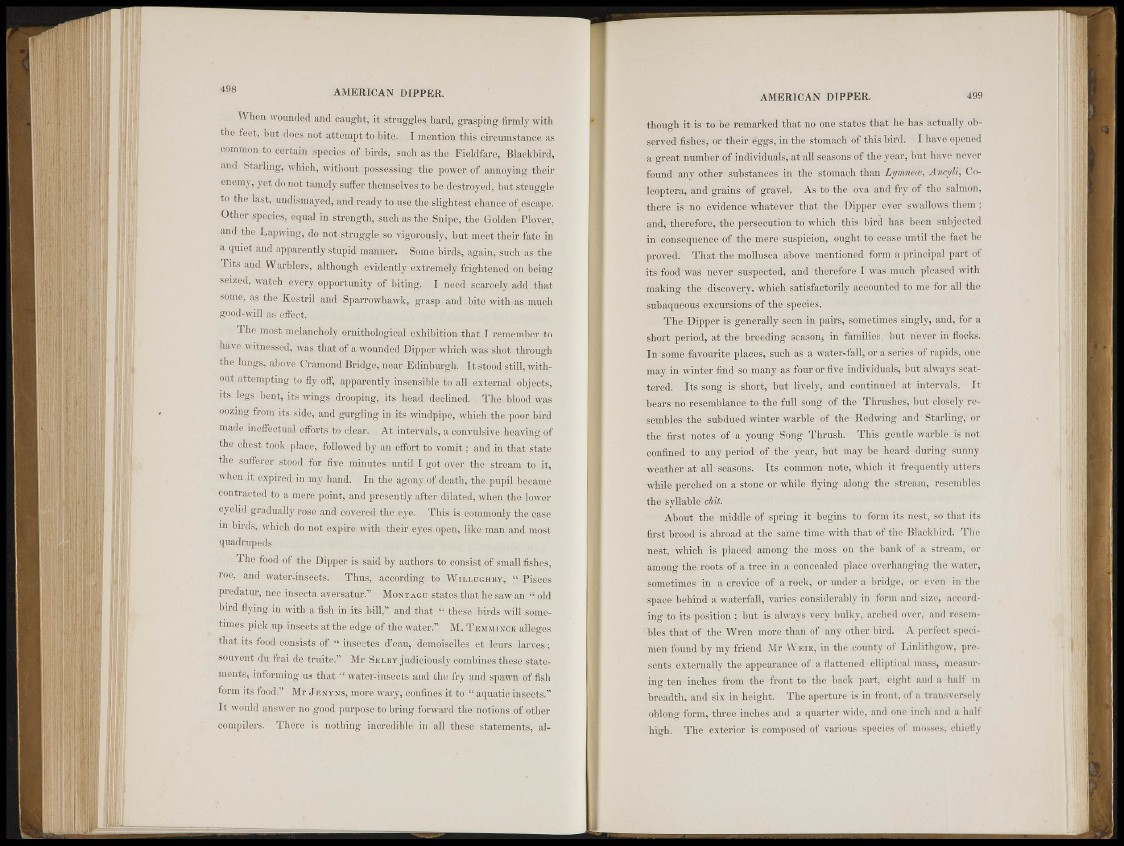
498 A M E R I C A N DIPPER.
When wounded and caught, it struggles, hard, grasping firmly with
the feet, but, does.not, attempt to bite. I mention this circumstance as
common,to certain species of birds, such as the. Fieldfare, Blackbird,
Wfl Starling, which, without pos.sesiiitg.tli.- power of annoyip'g their
enemy, yet clta not tamely suffer .themselves to be destroyed, but struggle
to the last, undismayed-, and ready to use the slightest chance of i!sc:ap.e.
( H , 1 0 r spesifs-, equal in strougtii, such as the Snip.!, the (¡olden I Mover,
ffid the Lapwing-; do not struggle so vigorously, but, meet their fate in
a quiet and apparently stupid manner. 'Some birds, again, such- a* the
Tits and Warblers, although .evidently j'xtromidy. frightened on being
seized, watch every, opportunity of biting. I need, scarcely, add that
some> ilH , l l n Kestril and Sparr.whawk, grasp and, bitewith (as,, much
good-will as. effect.
The most melancholy ofaitholQgical exhibition that„I remember to
have witnessed-, was that of a wounded Dipper which was shot through
the lungs, above Crataond Bridge, near Edinburgh!. , It,stood still, without
attempting to fly off, apjlaj-ently insensible to aM external; -objects,
its logs bent, its wings drooping, its head declined^ The blood was
"oozing from its.>ide,.;a,ml gurgling in its windpipe, which the poor bird
made ineffectual efforts to clear. At intervals,.a convulsive heaving of
the chest took place, followed by an effort to vomit; and in that state
the sufferer- stood for five minutes .until (.got mi-r the- stream to it,
when,It: expired in my hand. In the agony.of death, the pupil became .
contracted,tt> a more point, and presently after. dilated, when the lower
.Iffelid gradually rose and covered' the .eye.,, This is,commi,nl\ the. east:
in birds, which do not expire with their eyes open, like man and most
quadrupeds.
.• The food,of the Dipper is,said by authors to consist,of small fishes,
roeJ !1!"l water-insects. Thus, according, to Wiu.kc-hhy. " Pisces
predatur, nee insoctn aversatur." Moxtaui;- states that he saw- an " old
bird flying in with a fish iifiit.s bill,"' and that " these birds wilt .sometimes
pick up insects at the edge of the water," M, Temmingk alleges
that its food consists of " insestesd'eau, demoiselles- ct-ileurs larves.;
souvent du frai do truite." .Mr Sixui-.jndici'ously oombines.thoM!:statoinents,
informing us that water-insects and the fry and spawn of fish
form its food." Mr Jknyxs, more wary, confines it to " aquatic insects."
It would answer no good purpose to bring forward the notions oi' other
compilers, There is nothing incredible in all these statements, al-
A M E R I C A N DIPPER. 499
though it is to be remarked that, no one states that he has actually observed
fishes, or their êggB, in the stomach of this bird. I have opened
a great number of individuals, at all seasons of the year, but have never
found unv other 'substance^ in the stomach than Lymnece. Ancytt, G&-
leopéera, and grains of gravel. As to the ova and fry of the salmoni,
there is no evidence whatever that the Dippèr ever swallows them ;
and, therefore, the persecution tiîwhich this bird has been subjected
in cons&îptonoo of the mere suspicion, ought to cease until the fact be
proved. • That the mollusca above mentioned form a principal part of
its food was never suspected, and therefore I Was much pleased with
mating the discovery, which satisfactorily accounted to me for all the
subaqueous excursions of the species.
The:; Dipper is generally seen in pairs, sometimes singly, and, for a
short period, at the -breeding season, in families, but never in flocks.
In some favourite plac.i-s, such as a water-fill, or a series of rapids, one
may in winter find j | i many as four or five individuals, but always scattered.
Its song is short, but lively, and continued at intervals. It
bears rio resemblance to the full song of the Thrushes, but closely resembles
the subdued winter warble Of the Hcilwing and Starling; or
the first notfes of a young Song Thrush. This gentle warble is not
confined I » any period of the' year, but may be heard during sunny
weather at all seasons. Its common note, which it frequently utters
while perched on a stone or while flying along the stream, resembles
the sv liable chit
About the middle of spring it begins to form its Bèst, SO'that its
first brood is- abroad at the same time"with that of the Blackbird. The
neSt, which is placed among the moss on the bank of a stream, or
among the roots-of a tree in a concealed place, overhanging the water,
sometimes in a crevice of â rock, or under a bridge, or even in the
space behind à waterfall, varies- considerably in form and size, according
to its. position ; but is always very bulky, arched over, and resem-
. hies that of the Wren more than of amy other bird. A perfect specimen
found by my friend Mr Weir, in the county of Linlithgow, presents;
externally the appearance of a flattened elliptical mass, measuring
ten inches from the front to the back part, eight and a half in
breadth, and six in height. The aperture is in front, of a transversely
oblong form, three inches and a quarter wide, and one inch' and a half
high. The exterior is composed of various species of mosses, chiefly